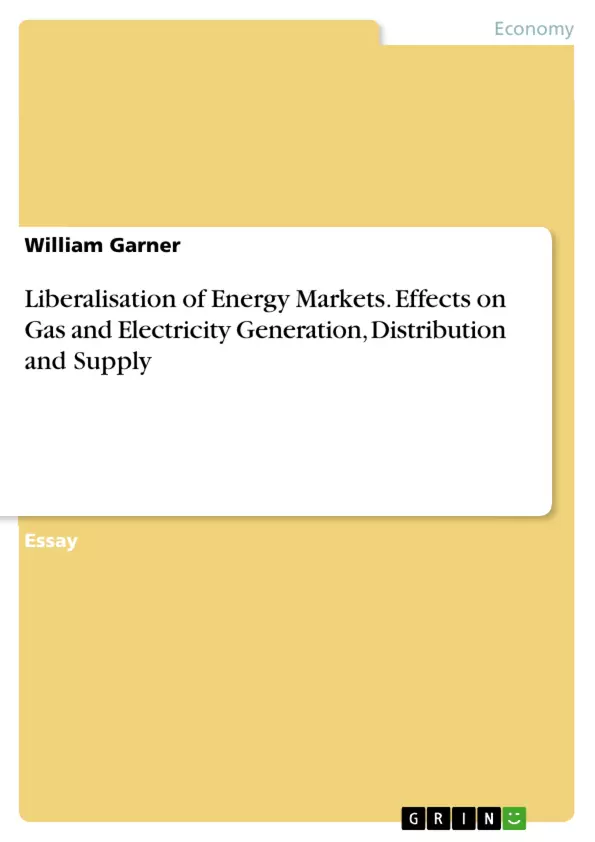Consumers mainly benefited from the liberalisation of UK energy markets in the 1980s through privatisation under Thatcher, because of lower prices due to increased competition between rival energy firms. This is because instead of a single monopoly, competitive markets try and compete through price wars.
The energy markets were monopolies in many EU countries and held dominant power in the energy market which is considered inefficient. The EU claim that Liberalisation of the energy markets will benefit consumers through; raising employment levels, increasing business efficiency and increasing a country's potential economic development and GDP growth. We therefore need to focus on the impact of Liberalisation on these key areas to assess how advantageous this increase in competition has on the energy market.
Inhaltsverzeichnis (Table of Contents)
- Liberalisation of the Energy Markets
- Impact on Employment
- Impact on Business Efficiency
- Impact on Economic Development and GDP Growth
- Liberalisation of the UK Energy Markets
- Impact on Consumers
- Impact on Employment
- Impact on Business Efficiency
- Impact on Economic Development and GDP Growth
- Liberalisation of Energy Markets in Other EU Member States
- Impact on Consumers
- Impact on Employment
- Impact on Business Efficiency
- Impact on Economic Development and GDP Growth
Zielsetzung und Themenschwerpunkte (Objectives and Key Themes)
This paper explores the effects of liberalisation on energy markets in the European Union, specifically focusing on the gas and electricity generation, distribution, and supply sectors. The paper aims to outline, discuss, and compare the impact of liberalisation on key areas such as employment, business efficiency, and economic development.
- The impact of liberalisation on consumer benefits, including lower prices and increased choice.
- The effect of liberalisation on employment levels, both in the short and long term.
- The influence of liberalisation on business efficiency and competitiveness within the energy sector.
- The potential for economic development and GDP growth as a result of liberalisation.
- A comparative analysis of the success of liberalisation in different EU member states, highlighting the UK as a case study.
Zusammenfassung der Kapitel (Chapter Summaries)
The paper begins by defining liberalisation and examining its potential benefits for energy markets. It argues that liberalisation can lead to increased competition, lower prices, and higher employment levels. The paper then explores the specific case of the UK energy market, where liberalisation through privatisation in the 1980s led to significant consumer benefits due to lower prices and increased competition. The paper also examines the effects of liberalisation on employment, business efficiency, and economic development in the UK. Subsequently, the paper compares the UK experience with other EU member states, highlighting the challenges and limitations of liberalisation in countries like France and Germany. The paper concludes by suggesting that while the advantages of liberalisation outweigh the disadvantages, the success of liberalisation depends on factors such as the initial state of the energy market and the economic context.
Schlüsselwörter (Keywords)
The main keywords and focus topics of this paper include liberalisation, energy markets, competition, consumer benefits, employment, business efficiency, economic development, GDP growth, UK energy market, privatisation, EU energy market, case studies, comparative analysis, and policy evaluation.
Frequently Asked Questions
What are the main benefits of energy market liberalisation?
Liberalisation aims to increase competition, leading to lower energy prices for consumers, improved business efficiency, and potential GDP growth.
How did privatization under Thatcher affect the UK energy market?
Privatization in the 1980s ended state monopolies, introducing competition that resulted in lower prices and more choices for UK consumers.
Does liberalisation impact employment levels?
The EU claims liberalisation can raise employment levels, although the short-term effects may vary as companies restructure for efficiency.
What is the role of the EU in energy market changes?
The EU promotes liberalisation to create a unified, efficient energy market across member states, reducing the power of national monopolies.
How do gas and electricity sectors differ in this process?
While both are being liberalized, the infrastructure for distribution and the nature of supply present different challenges for competition in gas versus electricity.
- Arbeit zitieren
- William Garner (Autor:in), 2012, Liberalisation of Energy Markets. Effects on Gas and Electricity Generation, Distribution and Supply, München, GRIN Verlag, https://www.grin.com/document/323337



